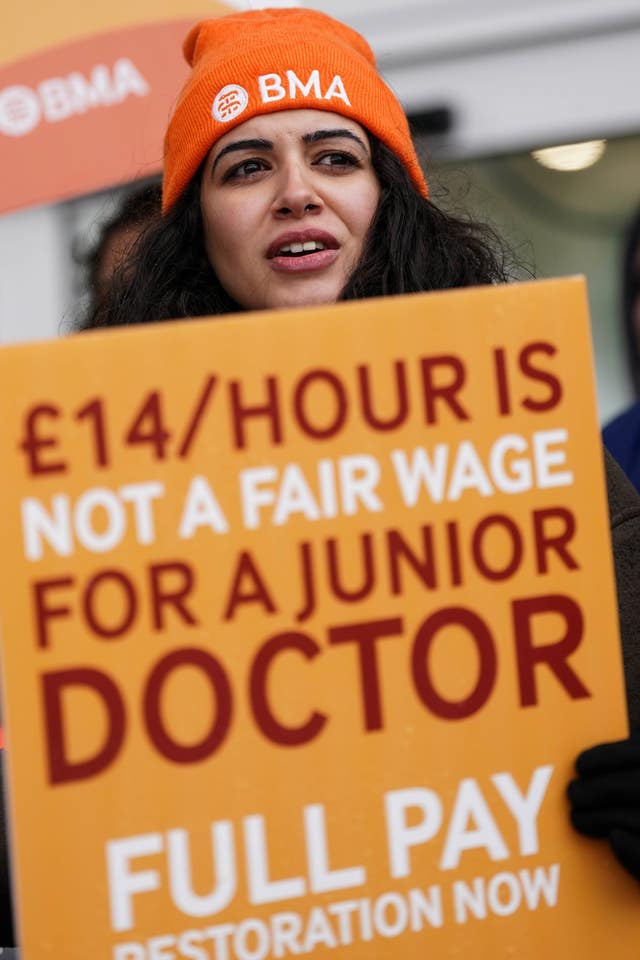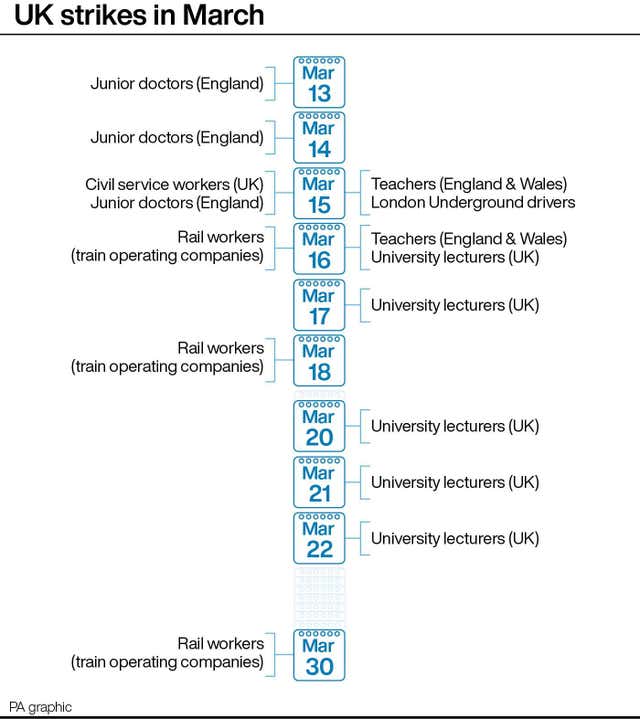Thousands of junior doctors have entered a second day of walkouts as health leaders warned that the NHS is facing “high pressure” as a result of the strikes.
Tens of thousands of appointments and operations are expected to be cancelled as a result of the 72-hour strike in England, which began on Monday morning.
More than 100,000 appointments have already been postponed this winter after nurses and other health workers took strike action in a dispute with the Government over pay, according to NHS figures.
NHS leaders said that emergency care and other departments were under significant pressure, even with consultants and other staff taking on the work of junior doctors on picket lines.
The British Medical Association (BMA) says junior doctors’ pay has fallen in real terms by 26% since 2008/09 and reversing this would require a 35.3% pay rise.
On Friday, Health Secretary Steve Barclay invited the BMA to talks – but the union rejected the idea, saying there were “unacceptable” pre-conditions.

The pre-conditions are understood to have included looking at a non-consolidated lump sum payment for last year, whereas the BMA is seeking what it calls “full pay restoration”.
The union has implored the Government to drop the preconditions.
Dr Rob Laurenson and Dr Vivek Trivedi, co-chairs of the BMA’s junior doctor committee, said in a statement: “We remain open to entering talks with the Government anytime and anywhere to bring this dispute to a swift resolution and restore the pay that junior doctors have lost.
“If the Health Secretary is truly committed to this, then he needs to drop these unreasonable pre-conditions and begin proper negotiations with us.
“The pre-conditions go against the very thing junior doctors are in dispute over. It begs the question; does he even understand why doctors are so angry?
“Patients and doctors want a quick end to this dispute, but it seems the Government want to prolong it. So, we are asking him to drop the barriers he has put in place and start talking – doctors and patients deserve nothing less.”
Junior doctors make up around 45% of the NHS’s medical workforce, and consultants and other medics have been drafted in to provide strike cover in areas such as A&E.
Hospital bosses have said that they were planning services “hour by hour” during strike action and are diverting more senior doctors, who are not on strike, to the services in “greatest clinical need”.
Professor Stephen Powis, medical director of NHS England, told BBC Radio 4’s Today programme on Monday the strikes are “likely to be the most severe of all those (strike) days this winter, perhaps even the most severe disruption that we’ve seen of any strike in the NHS during its history”.

Matthew Taylor, chief executive of the NHS Confederation, said: “Leaders have worked hard to minimise disruption but with junior doctors making up nearly two fifths of an already understaffed workforce, thousands of appointments and non-urgent procedures have still needed to be cancelled so that the most life-critical services can be prioritised.
“Even with consultants and staff from other services working together to fill shifts, emergency care and other departments are still facing very high pressure. Health leaders expect this to continue over the next two strike days and beyond, particularly when those putting in extra work now need to take time off in lieu.”
He added: “There are no winners in the current standoff between the BMA and the Government. On behalf of our members and the communities they serve, we urge both sides of this dispute to compromise and bring these strikes to an end.”
Nick Hulme, chief executive of East Suffolk and North Essex NHS Foundation Trust – which runs Ipswich and Colchester hospitals, told the Today programme: “In terms of logistics around planning for the next three days, it’s very much hour by hour, see who comes in, see where we need to allocate our staff to.
“We are working with our doctors so that we can reallocate to where the greatest need is – whether that’s in ITU, whether that’s in A&E, whether that’s on the wards.”
Professor Philip Banfield, the BMA’s chairman of council, told the PA news agency from a picket line outside the Queen Elizabeth Hospital in Birmingham on Monday: “We have the worst crisis in the NHS that I have ever known and it’s seeing junior doctors leave in their droves.

“The junior doctors’ strike is so sad to see but they feel they have been driven to this.”
Talks between the Government and other health unions – including those representing nurses, physiotherapists and ambulance workers – will continue this week, holding out hope of a breakthrough in the long-running NHS pay dispute.
On Monday, Mr Barclay said: “It is incredibly disappointing the British Medical Association (BMA) has declined my offer to enter formal pay negotiations on the condition strikes are paused.
“I want to find a fair settlement which recognises the crucial role of junior doctors and the wider economic pressures facing the UK.
“I’ve been having constructive and meaningful talks with unions representing nurses, ambulance workers and other non-medical staff, which have agreed to pause strike action, and negotiations will continue this week.”
It comes as members of several trade unions will strike on Budget day on Wednesday in what will be one of the biggest single days of industrial action for years.
Workers taking action include civil servants, teachers, university staff, London Underground drivers and BBC journalists.
On Monday, Rishi Sunak said he does not think it right that “there is so much disruption” being caused by industrial action as he defended his administration’s anti-strikes legislation.
The Prime Minister, speaking to Sky News while in San Diego, US, said: “I don’t think it’s right that there’s so much disruption being caused to working families’ lives.
“That’s why I, as Prime Minister, introduced new laws to have minimum safety levels in our critical public services like rail, like education, like healthcare.
“It’s precisely because I do think people should not be able to have that disruption in their lives that I’m putting that new law through Parliament.”
You may also like: Watch: Theresa May slams Braverman’s Illegal Migration Bill

